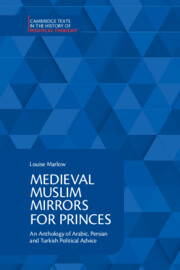Book contents
- Medieval Muslim Mirrors for Princes
- Cambridge Texts in the History of Political Thought
- Medieval Muslim Mirrors for Princes
- Copyright page
- Dedication
- Contents
- Figures and Maps
- Preface and Acknowledgements
- Conventions
- Abbreviations
- Part I Introduction
- Part II Texts
- 5 The Nature of Sovereignty
- 6 The King’s Person and Character
- 7 Foundations of Royal Authority and Principles of Governance
- 8 The Practice of Good Governance
- 9 Problems in the Kingdom and Their Remedies
- Appendix Index of Qurʾanic References and Quotations
- Glossary
- Bibliography
- Index
- Cambridge Texts in the History of Political Thought
7 - Foundations of Royal Authority and Principles of Governance
from Part II - Texts
Published online by Cambridge University Press: 15 January 2023
- Medieval Muslim Mirrors for Princes
- Cambridge Texts in the History of Political Thought
- Medieval Muslim Mirrors for Princes
- Copyright page
- Dedication
- Contents
- Figures and Maps
- Preface and Acknowledgements
- Conventions
- Abbreviations
- Part I Introduction
- Part II Texts
- 5 The Nature of Sovereignty
- 6 The King’s Person and Character
- 7 Foundations of Royal Authority and Principles of Governance
- 8 The Practice of Good Governance
- 9 Problems in the Kingdom and Their Remedies
- Appendix Index of Qurʾanic References and Quotations
- Glossary
- Bibliography
- Index
- Cambridge Texts in the History of Political Thought
Summary
The rhetoric of royal legitimacy emphasised divine selection and personal merit, but the proof of these qualities lay in the ruler’s measured but effective exercise of his power. For mirror-writers, evidence of fitness to rule depended on not only military success but also, and more particularly, the stability and prosperity of the realm. Foremost among the principles of governance, for many mirror-writers, was justice, understood partly in legal terms – the ruler was responsible for upholding the law – and partly in terms of the king’s judicious management of the multiple constituencies who made up his realm. The four texts in this chapter address the underlying supports of royal authority and the principles that rulers should adopt in their governance. Justice, central to the theory of virtue, appears in this context as central to the theory of governance. In enumerating the pillars necessary for the support of sovereignty, the authors represented in this chapter emphasise, in addition to justice, religion, force, wealth and kindness. The texts are drawn from Pseudo-Aristotle, Sirr al-asrār; al-Māwardī, Tashīl al-naẓar wa-taʿjīl al-ẓafar; Niẓām al-Mulk, Siyar al-mulūk; and al-Ṭurṭūshī, Sirāj al-mulūk.
- Type
- Chapter
- Information
- Medieval Muslim Mirrors for PrincesAn Anthology of Arabic, Persian and Turkish Political Advice, pp. 180 - 215Publisher: Cambridge University PressPrint publication year: 2023

